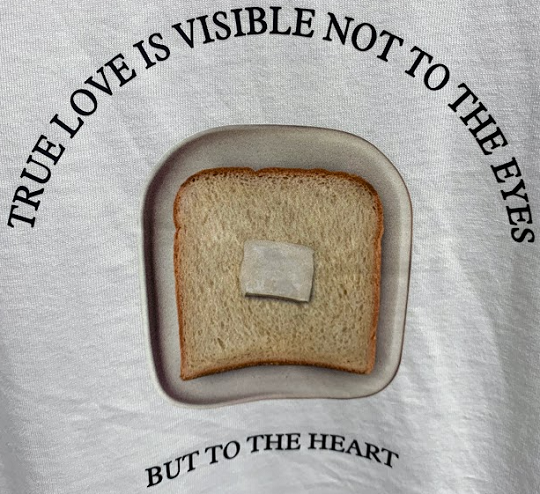Incidentally, that is likely an etymologically correct use of hocus pocus, which probably originated as a corruption of hoc est corpus, "this is the body (of Christ)."
This afternoon, I briefly visited a clothing store -- I just felt a random urge to go in and look around, which is something I very rarely do -- and I saw this T-shirt for sale:
"True love is visible not to the eyes but to the heart." Why this is illustrated with a slice of bread is anyone's guess -- the thought process behind East Asian T-shirt design will forever remain opaque to us -- but I think it's safe to say no allusion to transubstantiation was intended. (I don't think sacramental butter is a thing.) Massive coincidence. (Pun intended.)
After that, I returned to my office, where I found that some tabs were still open from when I was writing my last post. One of these was a Google image search for adoration of the blessed sacrament, which I had run to confirm that monstrances are associated with that practice rather than with the Mass proper. There in the second row of image results was this:
For my non-Catholic readers, the gold object is a monstrance, at the center of which is the sacramental bread. That is, it looks like bread, but we are informed that it is actually Love Incarnate. True love is visible not to the eyes but to the heart.






6 comments:
"the thought process behind East Asian T-shirt design will forever remain opaque to us" - I laughed out loud at this.
Doesn't this sync with door post as well and the gift to the bartender?
This seems to also relate to Dr. Charlton's recent posts mentioning John. Jesus states He is the bread and the simplicity of the message that many miss it or overlook. Bread is like that.
It could be that there's actually no such being as a spirit and that what's actually happening when people think they're interacting with a spirit is that they're interacting with an aspect (called the spirit) of a full being.
This would explain the imagined separation between the Holy Spirit and Jesus; the 'Holy Spirit' would not be a spirit but just an aspect of Jesus - a full being - that people can genuinely interact with (maybe via their own spirit).
If the sacramental bread is genuinely putting people in touch with the spirit of Jesus (genuinely a spiritual interaction, not just concentrating thinking or something like that) then the bread could be understood in a similar way to other physical aspects of a being eg their voice, or visage; aspects of the 'body' facilitating spiritual interaction.
This was written around 150 AD
> And this food is called among us Εὐχαριστία [the Eucharist]… For not as common bread and common drink do we receive these; but in like manner as Jesus Christ our Saviour, having been made flesh by the Word of God, had both flesh and blood for our salvation, so likewise have we been taught that the food which is blessed by the prayer of His word, and from which our blood and flesh by transmutation are nourished, is the flesh and blood of that Jesus who was made flesh. For the apostles, in the memoirs composed by them, which are called Gospels, have thus delivered unto us what was enjoined upon them; that Jesus took bread, and when He had given thanks, said, “This do in remembrance of Me, this is My body;” and that, after the same manner, having taken the cup and given thanks, He said, “This is My blood;” and gave it to them alone.
The Catholic Church explains that you are not receiving Jesus spiritually, but literally eating his eternal living flesh and blood. Furthermore Mass is the True Sacrifice in some supernatural way - not just a mere reenactment of His crucifixion. This is heavily downplayed though in the New Order since the 1960s changes.
It's easy to see why they might have been accused of cannibalism or other dark rituals early in Church history.
Also while Dr. Charlton disagrees with the Trinity concept, the theory that receiving the Holy Spirit is literally receiving Jesus certainly isn't heretical - though incomprehensibly a separate Person, still God Himself. Typically described as the embodiment of Love itself.
Against the charge that it makes no sense, there is no defense - as all Priests I believe agree that it is only through Faith believed, and in itself not comprehensible.
Post a Comment